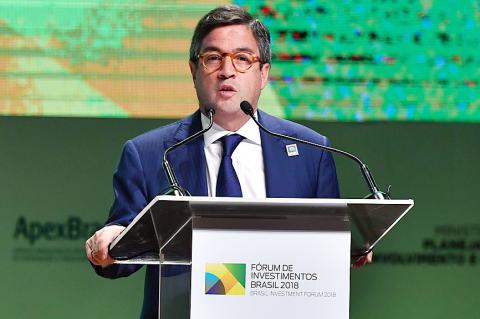The Inter-American Development Bank (IADB) on Friday called off next week’s meeting of its 48 member countries in China after Beijing refused to allow a representative of Venezuelan opposition leader Juan Guaido to attend, two sources with knowledge of the matter said.
The decision was made in Washington on Friday at a meeting of the executive board of the IADB, Latin America’s largest development lender, after China refused to change its position, the sources said.
The board would vote within 30 days to reschedule the annual meeting for another date and location, they said.

Photo: AFP
On Thursday, the US threatened to derail the meeting unless Beijing granted a visa to Guaido’s representative, Harvard economist Ricardo Hausmann.
The meeting, scheduled to bring together finance and development ministers from the lender’s members, was meant to mark the bank’s 60th anniversary.
Guaido in January declared himself interim president of Venezuela, saying that the re-election of Venezuelan President Nicolas Maduro was not legitimate.
Most Western countries have recognized Guaido as head of state, but Russia and China, among others, back Maduro.
One source, speaking on condition of anonymity, on Thursday told reporters that China had proposed that no representative from either Maduro’s or Guaido’s camps attend the meeting to “depoliticize” the gathering.
In a statement posted later on its Web site, the IADB confirmed that the meeting would not take place from Thursday to Saturday next week in Chengdu, China, as planned, but it did not give a reason.
The Chinese Ministry of Foreign Affairs said in a statement that it regretted the decision, but bore no responsibility.
Ministry spokesman Geng Shuang (耿爽) said that China “had difficulty allowing” Guaido’s representative to attend, because Guaido himself lacked legal standing.
“Changing Venezuela’s representative at the IADB won’t help solve Venezuela’s problems, and [the proposal] damaged the atmosphere of the IADB annual meeting and disturbed preparations for the meeting,” Geng said.
The Washington-based IADB was the first multilateral lender to replace a Maduro-selected representative with one backed by Guaido. The move would eventually open lines of credit to Venezuela should Maduro step down.
The IMF and World Bank have not decided on whether to officially recognize Guaido as head of state.
Had the annual meeting taken place next week, it would have been the first time the IADB held it in China.
The Asian country has become a major player in Latin America and has poured more than US$50 billion into Venezuela over the past decade in oil-for-loan agreements.

MAKING WAVES: China’s maritime militia could become a nontraditional threat in war, clogging up shipping lanes to prevent US or Japanese intervention, a report said About 1,900 Chinese ships flying flags of convenience and fishing vessels that participated in China’s military exercises around Taiwan last month and in January last year have been listed for monitoring, Coast Guard Administration (CGA) Deputy Director-General Hsieh Ching-chin (謝慶欽) said yesterday. Following amendments to the Commercial Port Act (商港法) and the Law of Ships (船舶法) last month, the CGA can designate possible berthing areas or deny ports of call for vessels suspected of loitering around areas where undersea cables can be accessed, Oceans Affairs Council Minister Kuan Bi-ling (管碧玲) said. The list of suspected ships, originally 300, had risen to about

DAREDEVIL: Honnold said it had always been a dream of his to climb Taipei 101, while a Netflix producer said the skyscraper was ‘a real icon of this country’ US climber Alex Honnold yesterday took on Taiwan’s tallest building, becoming the first person to scale Taipei 101 without a rope, harness or safety net. Hundreds of spectators gathered at the base of the 101-story skyscraper to watch Honnold, 40, embark on his daredevil feat, which was also broadcast live on Netflix. Dressed in a red T-shirt and yellow custom-made climbing shoes, Honnold swiftly moved up the southeast face of the glass and steel building. At one point, he stepped onto a platform midway up to wave down at fans and onlookers who were taking photos. People watching from inside

Japan’s strategic alliance with the US would collapse if Tokyo were to turn away from a conflict in Taiwan, Japanese Prime Minister Sanae Takaichi said yesterday, but distanced herself from previous comments that suggested a possible military response in such an event. Takaichi expressed her latest views on a nationally broadcast TV program late on Monday, where an opposition party leader criticized her for igniting tensions with China with the earlier remarks. Ties between Japan and China have sunk to the worst level in years after Takaichi said in November that a hypothetical Chinese attack on Taiwan could bring about a Japanese

The WHO ignored early COVID-19 warnings from Taiwan, US Deputy Secretary of Health and Human Services Jim O’Neill said on Friday, as part of justification for Washington withdrawing from the global health body. US Secretary of State Marco Rubio on Thursday said that the US was pulling out of the UN agency, as it failed to fulfill its responsibilities during the COVID-19 pandemic. The WHO “ignored early COVID warnings from Taiwan in 2019 by pretending Taiwan did not exist, O’Neill wrote on X on Friday, Taiwan time. “It ignored rigorous science and promoted lockdowns.” The US will “continue international coordination on infectious